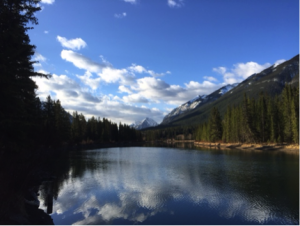By Mary Burgess
Two Big Takeaways
As with so many conferences, the Open Education Consortium Conference in Banff last week was a wonderful opportunity to connect with colleagues, learn new things, confirm my thinking on some issues and make me question myself on others. It was particularly nice to meet the rest of the OEC board members and staff as I had only done so online so far. My head is swimming but for now, I’m going to focus on 2 big takeaways.
This is a global community, and there are global needs we should be thinking about.

Axel Meisen, Past President of the Canadian Commission for UNESCO, gave an inspirational talk in which he described the need for OER in developing nations. In particular, he pointed to the example of the 20 million people around the world living in refugee camps who have not only a desire to learn, but also a lot of time on their hands in which they could, if they had the educational resources, be learning new skills that would help them when their living situations stabilized.
At OpenEd 2009 in Vancouver, I remember very distinctly the keynote given by Catherine Ngugi, Project Director for OER Africa. She pointed to the need for projects like ours and others to connect with projects like hers in our OER development thinking, so we’re not just creating resources and throwing them over the fence hoping they’re going to be useful to someone.
There was talk at the Conference about helping students work toward a competency I’ll refer to as “Global Citizenship”. This isn’t just a competency we should help students with. All of us could be more effective, particularly if our goal is adoption of our resources, if we thought more about our potential reach and how to meet needs in a global way while still serving our local communities.
How does this impact the work we’re doing at BCcampus? One of the first things that occurred to me is accessibility of our resources on mobile devices. In many developing nations, access to the Internet is severely limited, however this is often not the case with phones due to advances in mobile infrastructure. We’ve already done a lot of work on accessibility and many of the texts in our collection are available in formats that work well on mobile devices, but there is more we could do, particularly with rich media.
In addition, I’m betting that making sure our resources are easily editable so that they can be translated, reformatted and remixed would also go a long way. If you have other ideas about how we could, in a not too resource intensive way, make headway in this regard, we’d love to hear from you. I’m so proud of the work we’ve done so far on the Open Textbook Project, particularly our continued outreach work with the BC Post Secondary community. I’m hoping we can continue that while we take a broader view of the world as consumers of our work.
It’s time to think more about Open Educational Practices.
Many presenters at the conference talked about open practices as opposed to just objects, resources… essentially things. As some of you know, we’ve been moving in that direction at BCcampus in our exploratory work on Open Pedagogy. We’ve been following the work of Lumen Learning on this front, and we’ve been lucky enough to get a chance to take a look at their workshop frameworks. We’re also really looking forward to learning from our colleagues Dave Ernst and Sarah Cohen of the Open Textbook Network, who are also delivering workshops in this area. Approaching the use of OER with an instructional design lens brings two of my favourite things together so I’m thrilled to be able to contribute to this conversation.
There are so many opportunities to enrich and improve student learning experiences with OEP. We’re talking about student co-creation of content, faculty collaborations, and design that accommodates differences, is fluid, is flexible and is relevant. Stay tuned for more on this from BCcampus. We’ll be presenting about Open Pedagogy at the Open Textbook Summit May 28/29 (with Kim Thanos) and at the Educational Technology User Group Workshop in June.
It’s an inspiring time to be part of the Open movement!! If you want to access more of what happened in Banff, check out the Twitter stream with the #oeglobal hashtag.
